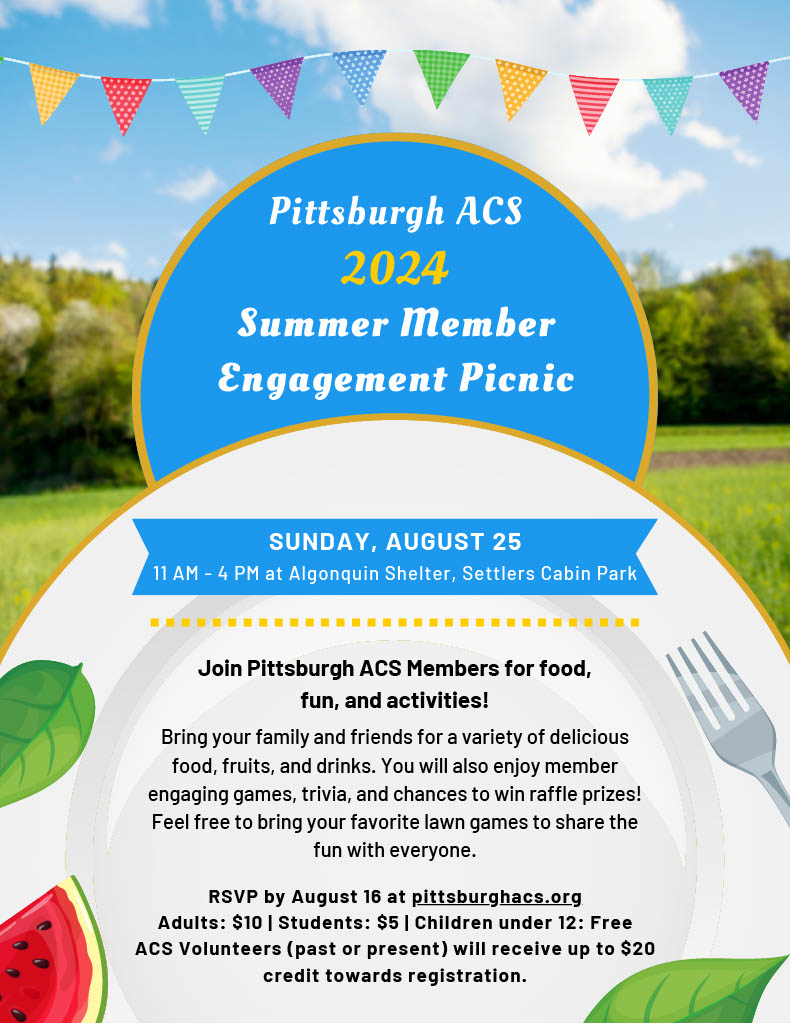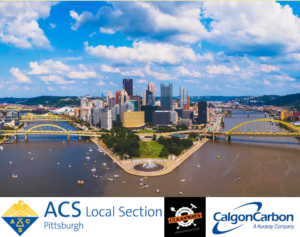Section News & Happenings
Summer Member Engagement Picnic
11:00 AM – 4:00 PM on Sunday, August 25, 2024
Algonquin Shelter, Settlers Cabin Park, 608 Ridge Rd, Pittsburgh, PA 15205
Join Pittsburgh ACS Members for food, fun, and activities! We will provide a variety of delicious foods, fruits, and drinks. You will also enjoy member engaging games, trivia quizzes, and chance to win a raffle. Feel free to bring your favorite lawn games such as frisbee, corn hole, or any other ball games to share the fun with everyone.
Registration fees are refundable upon attendance! The first six new members signed up on-site will receive free standard membership. Gas subsidies will be provided for those who travel more than 50 miles, at $0.25 per mile up to a total of 2000 miles.
Click here to download event flyer. Register for the picnic by August 16. Registration fees are refundable upon attendance!

Professor Dave Waldeck awarded 2024 Edward W. Morley Medal from the Cleveland Section of the ACS
Congratulations to Professor Dave Waldeck on being awarded the 2024 Edward W. Morley Medal from the Cleveland Section of the ACS. The purpose of the award is to recognize significant contributions to chemistry through achievements in research, teaching, engineering, research administration and public service, outstanding service to humanity, or to industrial progress. Read more here.
Volunteer at the Environmental Group’s Community Cleanup!
 Join the ACS Environmental Group for a community cleanup of Allegheny county! Location is TBD, but will be around the Mon Valley. T-shirt and lunch will be provided!
Join the ACS Environmental Group for a community cleanup of Allegheny county! Location is TBD, but will be around the Mon Valley. T-shirt and lunch will be provided!
Saturday, July 13, 2024, 9:00am-12:00pm (EST)
Environmental Group Lecture IX
Join the Environmental Group for the monthly lecture on June 5. Download the flyer here.
Water Reuse – The Solution for Sustainable Water Resource Management from the Earth to Moon & Mars
June 5, 2024, 12:00-1:00pm (EST)
Keisuke Ikahata, PhD, PE, PEng, Assistant Professor, Ingram School of Engineering, Texas State University
How to join:
Or contact [email protected]
May 2024 Edition of The Crucible
We are pleased to provide the May 2024 Issue of The Crucible. If you have something you would like included in future issues, please email Alysia Mandato at [email protected].
CERM 2024: Call for Award Nominations!
The Pittsburgh ACS Section is hosting the ACS Central Regional Meeting in November in Pittsburgh. We will be awarding a number of awards. Please apply! Applications are due by August 1, 2024. For more information, visit acscerm2024.org.
Stanley C. Israel Regional Award for Advancing Diversity in the Chemical Sciences
The purpose of this award is to recognize individuals and/or institutions who have advanced diversity in the chemical sciences and significantly stimulated or fostered activities that promote inclusiveness within the region.
E. Ann Nalley CERM Region Award for Volunteer Service to the American Chemical Society
The purpose of this award is to recognize the volunteer efforts of individuals who have served the American Chemical Society, contributing significantly to the goals and objectives of the Society through their Regional Activities.
DivCHED High School Teaching Award
The purpose of this award is to recognize, encourage, and stimulate outstanding teachers of high school chemistry in the Central Region.
Get to Know a Member: Kevin Noonan
 1. What is your work and ACS (if applicable) title?
1. What is your work and ACS (if applicable) title?
Associate Professor of Chemistry, Carnegie Mellon University
Director of the Pittsburgh ACS Local Section
2. How many years have you been in the ACS?
I have been an ACS Member for 12 years. I have been involved in the local section for the past 5 years.
3. What is the biggest benefit of ACS Membership?
The connections. I think in particular I have found that connecting with the local section has been amazing for meeting fellow chemists in the local community. Everyone has different areas of expertise with a mutual interest in this physical science.
4. What did you want to be when you were a child?
I probably wanted to be an athlete of some kind, though I always loved science classes in school. My favorite sports growing up were basketball and volleyball, so probably a basketball player.
5. What made you fall in love with Chemistry?
My high school chemistry teacher was really fantastic. Mr. Spencer had a way of making each class fun and interesting so it was always a class I just enjoyed going to. In University, I spent a little time undeclared as a major, but I elected to take physical and inorganic chemistry because the classes looked interesting. After completing those courses, I started to think maybe this is a good place for me.
6. Which chemist, past or present, would you like to meet and why?
Stephanie Kwolek. I would love to hear more about her time at Carnegie Mellon (before it was Carnegie Mellon) and her time at Dupont and the discovery of Kevlar.
April 2024 Edition of The Crucible
We are pleased to provide the April 2024 Issue of The Crucible. If you have something you would like included in future issues, please email Alysia Mandato at [email protected].
Call for CCEW Volunteers
The Pittsburgh Section of the American Chemical Society needs volunteers to share the chemistry of batteries with the community during Earth Month! We are collaborating with the Pittsburgh Parks Conservancy at their Earth Month celebration event: Saturday, April 20 from 12 -3 PM at McKinley Park in the Beltzhoover neighborhood.
All materials and training will be provided. Please contact Chemists Celebrate Earth Week coordinator, Alysia Mandato, at [email protected] if you are interested in volunteering!
2024 CCEW Illustrated Poem Contest
The Pittsburgh Local Section of the American Chemical Society (ACS) is sponsoring an illustrated poem contest for students in kindergarten through 12th grade.
- Contest Deadline: Sunday, April 28, 2024, at 11:59 PM EST, https://forms.gle/PemLmiY87KbKQ8wt5
- Prizes: $50 for 1st place winners in each of four grade categories: K-2, 3-5, 6-8, and 9-12
- Contact: Alysia Mandato, CCEW Coordinator, [email protected]
Winners of the Pittsburgh Local Section’s Illustrated Poem Contest will advance to the National Illustrated Poem Contest for a chance to be featured on the ACS website and to win prizes!
